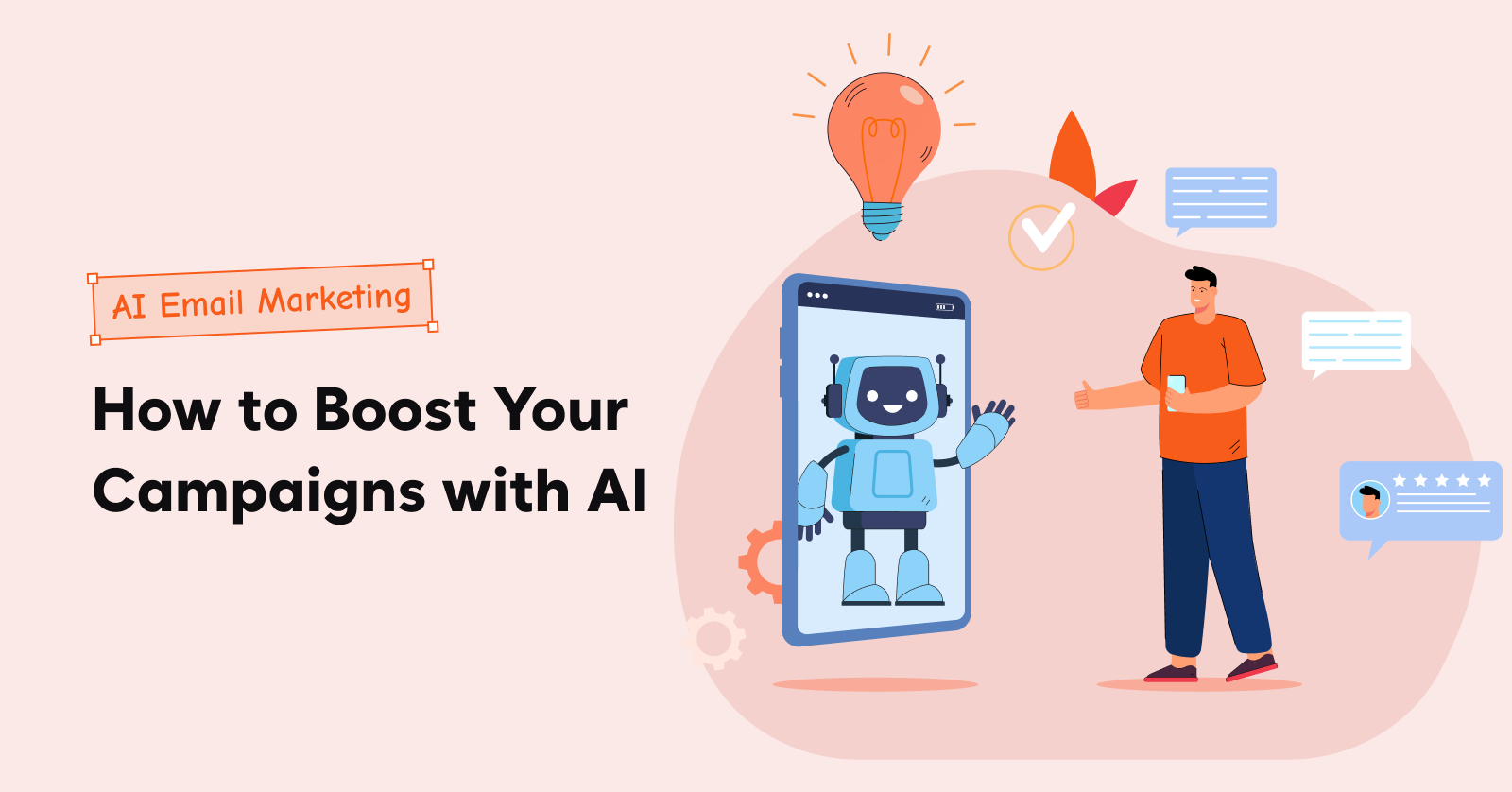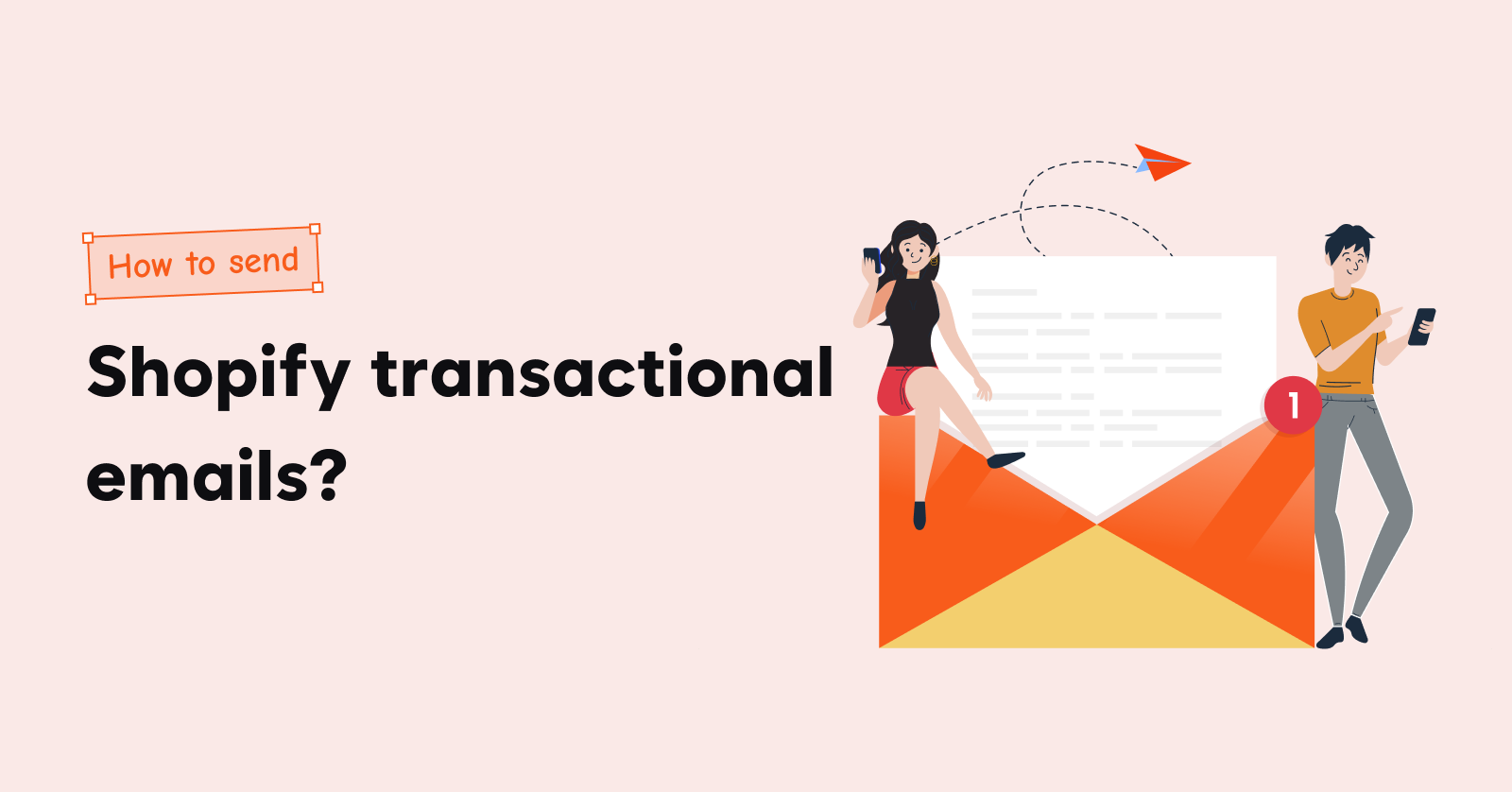Learning from the best email marketing examples can give you many insights into creating successful email marketing campaigns.
From a simple welcome message to a promotional campaign, every example of email marketing has a story to tell about connecting with audiences.
By analyzing them, we can uncover the ideas that went into making them and offer unique insights into how brands engage, inform, and convert their email subscribers.
We are going to do the same in this blog.
We listed the 15 best email marketing examples and analyzed why those templates stand out. We have also included a step-by-step guide on how to create an email marketing campaign.
Let’s dive right in.
Types of Marketing Emails
In email marketing, there are different types of campaigns you can send and they are determined based on where the customers are in their buying journey or the email marketing funnel. Some have just known your product and some might already be thinking about purchasing from you.
Each of those customers requires a different type of email campaign from you that prompts them to take the next step.
Here are those stages and corresponding marketing emails to send at each one.

- Lead nurturing email campaign – Focus on educating and building trust with leads who have shown interest in your brand but haven’t yet made a purchase.
- Promotional email campaign – Spotlight offers, discounts, or new products to grab attention and focus on converting recipients into buyers.
- Informational email campaign – Provide valuable content to educate and inform subscribers about your industry, products, or services.
- Transactional email campaign – Automated messages sent after specific actions or transactions, such as purchases, account updates, password resets, and order confirmations, providing relevant information or confirmations related to their activity.
- Reengagement email campaign – Target existing customers to encourage repeat purchases, foster loyalty, and turn them into brand advocates.
- Seasonal email campaign – Marketing messages sent during specific times of the year to capitalize on holidays, seasons, or significant events. They aim to engage subscribers by offering relevant promotions, content, or greetings that resonate with the season’s spirit.
Now that we know which emails would be perfect to send at every stage of the customer journey, we will move on to see some of the successful email marketing examples.
15 Best Email Marketing Examples
Successful examples of email marketing do something right to successfully engage customers and bring in conversions. By analyzing them, we can pick apart the best elements and emulate them in ours.
So, we listed the best email marketing examples, analyzed what they got right, and what you can do better while designing your email marketing templates.
The 15 best email marketing examples are:
- Moku – Lead nurturing email campaign example
- Brooks – Customer onboarding email example
- Crocs – Order confirmation email example
- Kizik – Abandoned cart email example
- Dollar Shave Club – Upsell/cross-sell email campaign example
- SightGlass – Feedback request email example
- Lumina – Referral email marketing example
- Huel – Thank you email marketing example
- Native – Loyalty email campaign example
- ATG Stores – Re-engagement email marketing example
- Cometeer – First-purchase offer email
- Pulp and Press – Social proof email marketing example
- Recess – Double opt-in email marketing example
- Mill – Comparison email marketing example
- Nike – Birthday email marketing example
Let’s pick apart these best email marketing examples in detail.
1. Moku – Lead nurturing email marketing example
When to send: After a welcome email (or as part of the welcome email series)
A well-crafted newsletter should balance promotional content with valuable information that subscribers find interesting, useful, or entertaining.
Newsletter emails are versatile and can be effectively utilized at multiple stages of the email marketing funnel. However, they are particularly impactful at the Top of the Funnel (TOFU) and Middle of the Funnel (MOFU) stages.
Here is a professional email marketing example for lead nurturing by Moku.

What makes this a good email marketing example?
This example of email marketing perfectly balances the informational and promotional tone. The template subtly introduces the CTA ‘Shop now’ and moves on to explain the product.
It gives a peek into what goes into making the product, informing the customers about the quality of it.
What to include in your lead-nurturing marketing email?
Apart from including information about your products, you can also send how-to guides, tips, and industry news as part of your newsletter email marketing campaign.
2. Brooks – Customer onboarding email example
When to send: Right after someone signs up for your email list
Welcome emails are like a first handshake with your customer. It should create a great first impression and set the stage for future interactions.
These best email marketing examples offer a great opportunity to introduce your brand and tell its story.
Here is how GoopKitchen does it in one of their email marketing examples.
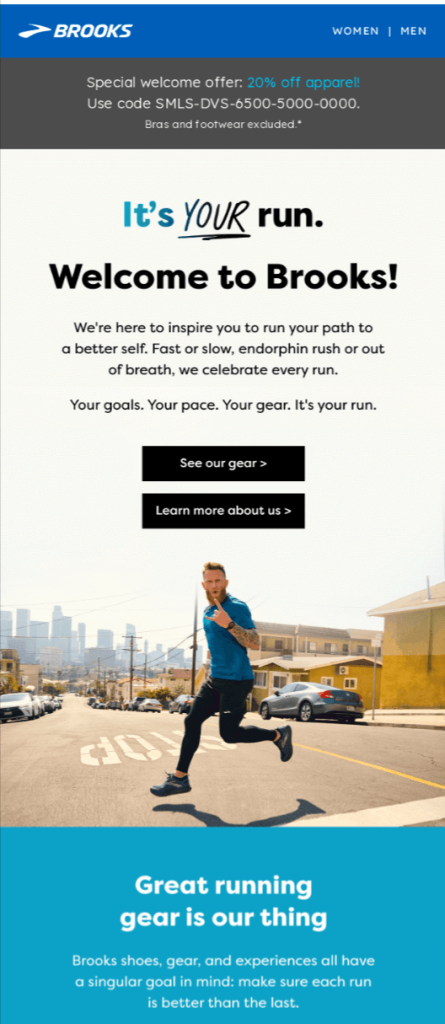
What makes this marketing email example stand out?
This welcome email template clearly delivers the welcome message, what the brand is about, and what the customer can expect from it.
Its CTAs also hits the spot. Instead of prompting the customers to shop from them at the beginning, they invite the customers to explore their brand more, and they move on to explain what they do best.
This best email marketing example also reminds us that a quality image of your products is crucial to creating a great first impression.
What to include in your email marketing template?
Sharing your brand story in the welcome email helps to build a deeper connection with the subscriber. This could be a message from the founder, the brand’s mission, or how your products/services make a difference.
Learn more: Learn how to create a welcome email series to bag repeat purchases: Welcome Email Series – Examples + How to create
3. Crocs – Order confirmation email example
When to send: Immediately after the purchase
Beyond serving as mere notifications, transactional emails like order confirmation emails enhance the customer experience, build trust, and create opportunities for further engagement and sales.
These best email marketing examples are the first email in the sequence of post-purchase follow-up emails you would send to customers.
So, it is imperative to get them right.
Here is how Crocs does it in one of their professional email marketing examples.
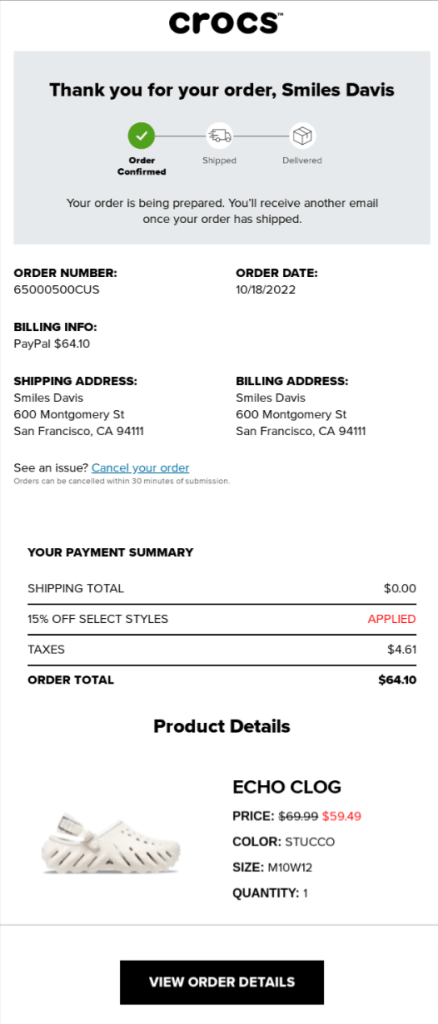
What makes this e-commerce email marketing example stand out?
It gives all the necessary information about an order – from shipping address and payment summary to product details.
These effective email marketing examples also give a heads-up for the next email, which is a best practice when it comes to order confirmation emails.
What to include in your email marketing template?
In your e-commerce email marketing campaign, you can recommend complementary products related to their purchased product.
While designing this example of email marketing, make it easy for customers to reach out if they have any questions or concerns by including contact information or a link to the customer service section of your website.
4. Kizik – Abandoned cart email example
When to send: Within 1-2 hrs after cart abandonment
Abandoned cart emails are a staple in e-commerce email marketing, as they are the best in recovering abandoned carts.
These e-commerce email marketing examples effectively remind customers about the abandoned cart and nudge them to finish the purchase.
You can provide an incentive and social proof and evoke urgency in the abandoned cart emails to persuade the customer.
Here is how Kizik does it in one of their best email marketing examples.
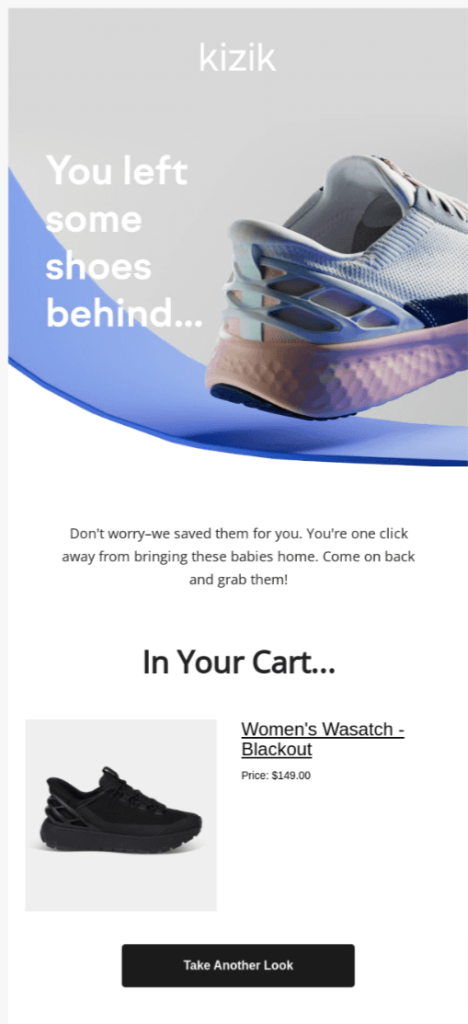
What makes this the best email marketing campaign example?
This creative email marketing example gently reminds the customer about the abandoned cart with a simple message and a picture of the cart item.
This example of email marketing has a subtle reminder message and a strong CTA that takes the customer directly to the cart page.
What to include in your abandoned cart email template?
One thing that is missing in this abandoned cart email template is the urgency. When customers feel that their favorite products are running out or an offer on the products is expiring soon, they are more likely to take immediate action.
Related Reading: Learn more about abandoned cart emails in our blogs:
Shopify Abandoned Cart Email – Strategies and Templates to Recover Lost Sales
How to Send WooCommerce Abandoned Cart Emails? A Step-by-Step Guide
5. Dollar Shave Club – Upsell/cross-sell email marketing example
When to send: A day after the order confirmation email
Upsell and cross-sell email marketing examples are about recommending products that complement their initial buys, prompting the customer to spend a bit more.
For upsells, suggest higher-end products or upgrades that enhance the value of their initial purchase. For cross-sells, recommend complementary products that are closely related to the original item.
These examples of email marketing explain how the recommended products add value to the customer’s original purchase or interest. These highlight benefits, features, or exclusive offers that make the additional purchase compelling.
See how Dollar Shave Club does it.

What makes this email marketing example stand out?
This effective email marketing example perfectly capitalizes on the opportunity of a follow-up email after an order to recommend the complimentary products – not one, but five.
Also, this example of email marketing included an upsell message below to nudge the customer to look at more products.
What to include in your marketing email campaign?
You can include compelling descriptions that highlight the features of the recommended products and explain how these products provide added value or solve a problem for the customer.
6. SightGlass – Feedback request email marketing example
When to send: A week after order delivery
These best email marketing examples are designed to solicit feedback from customers about their recent purchase experience, product satisfaction, or service interaction.
A feedback request email keeps the conversation going after the purchase and gives you valuable insight into how your product or delivery experience faired compared to the customer’s expectations. It is a good reality check.
Here is an email marketing example by SightGlass.
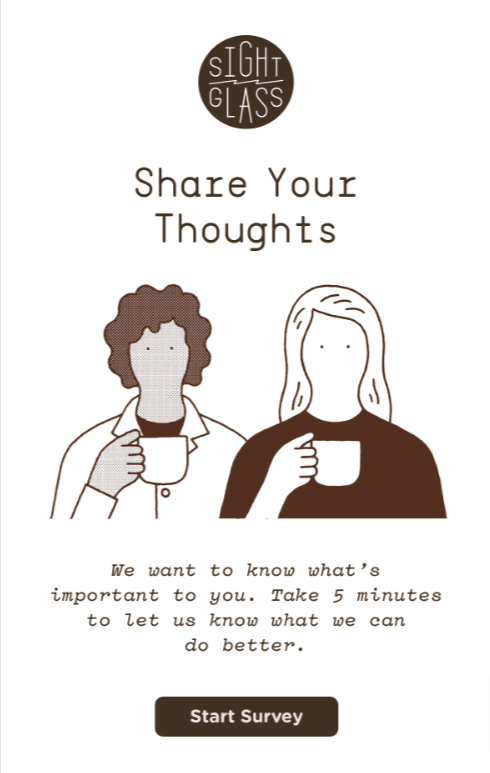
What makes this marketing email example stand out?
We like this email marketing example because it expresses how much it values the customer’s opinion in a few words.
Also, it points out the time it takes to complete the survey. Knowing that it will only take a few minutes can significantly increase the likelihood of participation.
What to include in your email marketing template?
Explicitly state the purpose of the email early on. Let recipients know why their feedback is important and how it will be used to improve your products, services, or overall customer experience.
7. Lumina – Referral email marketing example
When to send: After a customer is making repeated purchases
Now, your customer has made repeat purchases and provided you with positive feedback. It is time to turn them into your brand advocates and spread the word about your brand to their friends.
Referral emails leverage these happy customers to generate new leads, creating a cycle of positive experiences and growth for the brand.
Here is a great email marketing example by Lumina.
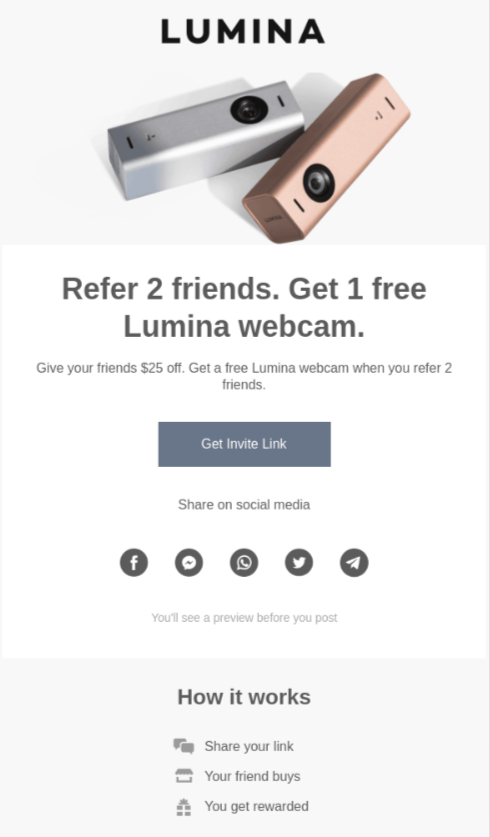
What makes this a good email marketing example?
This referral email marketing example ticks every box – clearly laid out rewards, CTA for referral link, handy social media links, and how their referral program works.
What to include in your template?
Ensure the referral process is as easy and straightforward as possible. Include a clear and prominent CTA button or link that takes customers directly to where they can make the referral.
In your referral email marketing campaign, consider using unique referral codes or personalized referral links that customers can easily share with their friends and family.
8. Huel – Thank you email marketing example
When to send: After the first purchase or sign-up
A simple thank you email goes a long way in making customers feel appreciated and valued, which is important to provide a positive post-purchase experience to the customers.
This example of email marketing can also be a touchpoint for further engagement, offering an opportunity to introduce customers to additional products, services, or content.
Here is how Huel does it while also giving a thank-you discount.
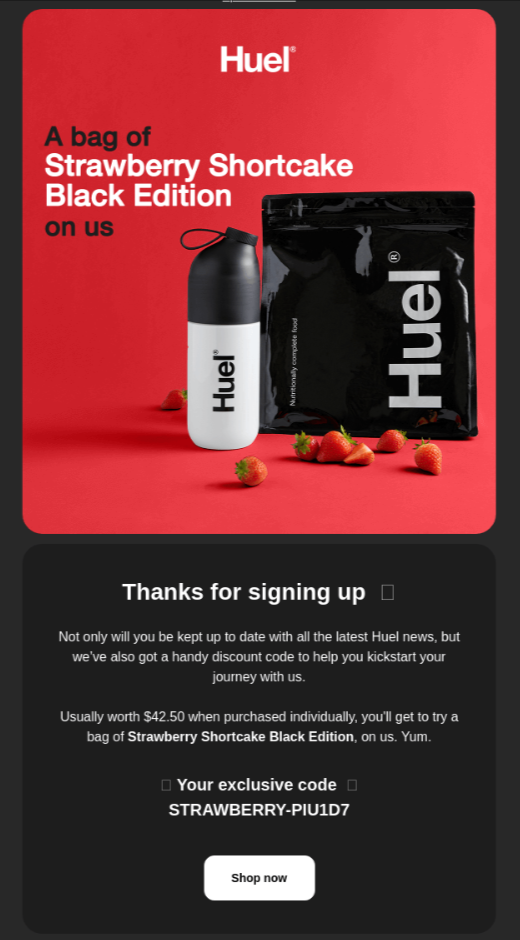
What makes this marketing email example stand out?
This best email marketing example starts the email by mentioning what the offer is, which gives an instant gratitude hit.
And then this example of email marketing goes on to mention what the subscriber can expect from the emails, and the best part is yet to come – an exclusive discount code. This makes the customer purchase a product as soon as they sign up.
What to include in your template?
You would find yourself sending a thank you email more than one time in a customer’s journey.
If you are sending a thank you email for a first purchase, you should confirm the transaction and express appreciation. If customers attend a webinar or participate in a survey, send a thank you email to acknowledge their time and involvement.
9. Native – Loyalty email campaign example
When to send: If your loyalty program has a sign-up process, trigger the first loyalty email as soon as they join or post-welcome email series.
What to offer those customers who have been stuck with your brand for long? Loyalty rewards or a simple appreciation message will do the job for you.
By sending these marketing email examples, you can retain customers for a long time and encourage them periodically to make repeat purchases.
Here is one of the good email marketing examples by Native.

What makes this a great email marketing example?
This email marketing campaign example does more than just convey what the earned rewards are – they can also point out the achievable. This loyalty email campaign template does exactly that.
This example of email marketing clearly outlines which actions get how many points and what the savings are for the customer.
What to include in your template?
In your email marketing campaign, acknowledge the customer’s loyalty and what it means to your brand.
Additionally, make sure to outline how they can redeem their rewards. In your loyalty email template, explain how many points they have earned or the rewards they can claim.
You also include special discounts, gift vouchers, or early access offers that are exclusive to your loyalty program members.
10. ATG Stores – Re-engagement email marketing example
When to send: After customer inactivity of 45 days
Not every customer sticks with you forever. Some drift off. But they are not a lost cause yet. Not when you present them enough reasons to come back through a re-engagement email or win-back email.
You should send a win-back email to a customer after a period of 60 days of inactivity.
Here is one of the great email marketing examples that does it right.
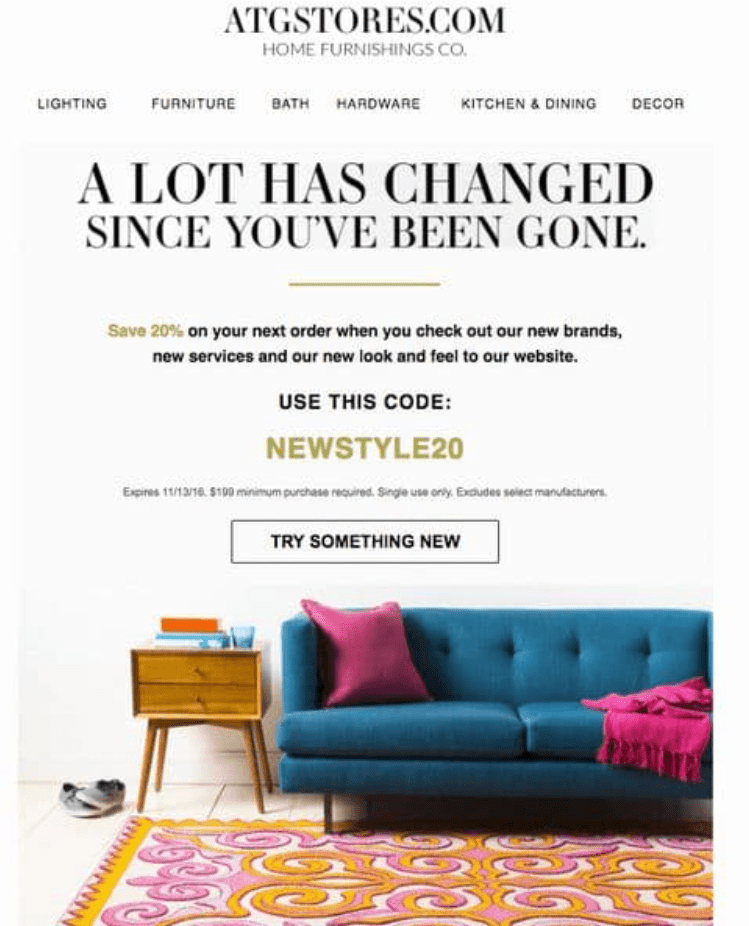
What makes this marketing email example stand out?
This good email marketing example focuses on informing inactive customers about the new products or features, which is a good strategy to rekindle their interest in your brand.
The above marketing email example paired this with an offer, which is also a great motivator to take a relook at the brand.
What to include in your win-back email template?
In your win-back email template, remind the customer of the unique benefits and value your brand offers. Highlight what sets you apart from competitors and why the customer chose you in the first place.
Or you can encourage customers to provide feedback on why they disengaged. This shows that you value their opinion and might turn them around.
11. Cometeer – First-purchase offer email
When to send: After sign-up welcome email
A first-purchase offer is an investment in the customer’s lifetime value. It reduces risk, offers immediate value, and converts hesitant buyers into purchasing ones.
What makes a banging first-purchase offer email even more compelling? Handling customer objections in the same email.
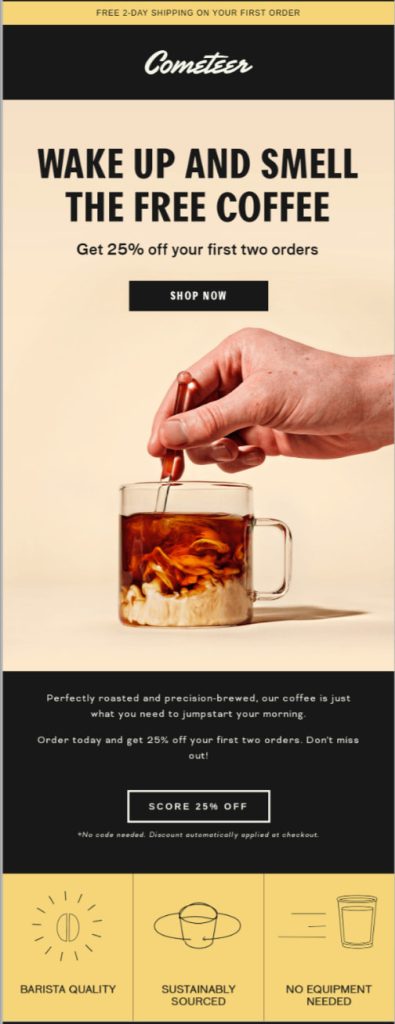
What makes this marketing email example stand out?
Many coffee drinkers don’t own espresso machines or grinders. This best objection handling email marketing example clarifies that no extra equipment is needed, they’re making the product accessible to a broader audience.
For an online coffee purchase, fast delivery can be a game-changer. People want their coffee ASAP. Offering 2-day shipping eliminates any impatience or worry about waiting too long.
In this first-purchase email example, removing the need to remember or enter a code makes it easy and hassle-free, which lowers friction for new buyers.
What to include in your first-purchase offer email template?
Adding urgency or exclusivity to the offer (e.g., “Valid for 7 days only”) leverages FOMO. It pushes customers to act now rather than later.
Your offer should have a clear monetary or experiential benefit that’s easy to understand. A vague or overly complex offer creates confusion and reduces its appeal.
- Good Example: “Enjoy free shipping on your next order, no minimum required.”
- Bad Example: “Discount applies to select items only, exclusions apply, see terms.”
12. Pulp and Press – Social proof email marketing example
When to send: As part of the lead nurturing email series
Social proof is one of the most powerful tools in persuasion. If others are doing it, it reduces the feeling of risk for the recipient.
It’s no longer just the brand saying “we’re great” – it’s other users backing it up.

What makes this email marketing example stand out?
Social proof email is perfect to send to a customer who is at the consideration stage, where the customer is yet to make the first purchase.
A deal alone is a good motivator for a first purchase – along with social proof it becomes irresistible. When you drop an offer after social proof, it doesn’t come across as pushy or salesy. It feels more like a natural next step.
What to include in your template?
Customers are more interested in how a product benefits them rather than its technical specifications. Highlighting benefits makes your offer more relatable and desirable.
Including testimonials, reviews, or digital badges builds credibility and reassures customers about the quality of your products and services.
13. Recess – Double opt-in email marketing example
When to send: A user submits their email address through an email sign-up form on a website or e-commerce store.
Sending double opt-in emails confirms that subscribers genuinely want to receive your emails, significantly lowering the likelihood of your emails being marked as spam.

What makes this email marketing example stand out?
This double opt-in email marketing example has a simple and prominent CTA. It’s easy to locate and understand, making the next step crystal clear for the subscriber.
The double opt-in confirmation email has a singular focus: to verify the subscriber’s email. The messaging is direct, ensuring the recipient knows exactly what they need to do.
What to include in your email marketing template?
Use a bold, eye-catching button that stands out from the rest of the email. Example: “Confirm My Subscription”
Clearly explain why the confirmation step is necessary to emphasize its importance (e.g., to ensure security or reduce spam).
14. Mill – Comparison email marketing example
A comparison email in email marketing lets you hammer home the features or benefits that set you apart. Whether it’s price, quality, or convenience, it’s your chance to voice them out.
The faster a customer understands why you’re better, the faster they’ll buy. Comparison emails reduce hesitation, eliminate doubts, and nudge customers toward hitting “Buy now.”

What makes this comparison email marketing example stand out?
The side-by-side breakdown is brilliant. It directly addresses the pain points of the competition while showcasing Mill’s superior features. People love comparisons when they’re easy to digest. This layout eliminates complexity and leaves no doubt about which product is superior.
Instead of naming competitors (which could backfire), the vague “Others” keeps the focus on Mill’s strengths without giving the competition free airtime.
Placing the CTA at key points ensures it’s always top of mind when the reader feels convinced.
This best comparison email marketing example doesn’t just say “better filter” or “quieter.” It quantifies the benefits
What to include in your comparison email template:
A clear “Us vs. Them” table – a side-by-side breakdown is the backbone of any comparison email. Keep it clean, visual, and easy to skim. Vague claims won’t cut it. Include quantifiable data like prices, performance metrics, and benefits.
You don’t need to name competitors outright, but subtle nods to “Others” can work.
15. Nike – Birthday email marketing example
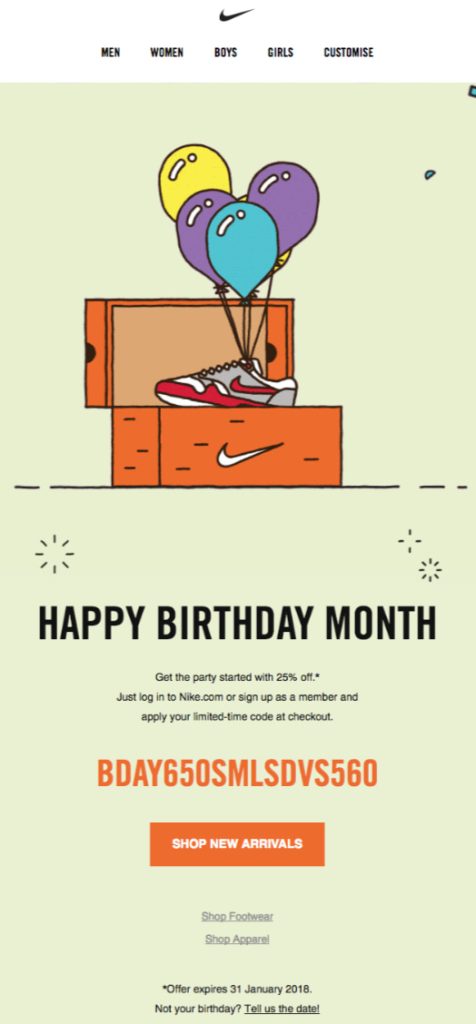
What makes this best email marketing example stand out?
Nike stretches the celebration into a full month. This makes the offer feel more flexible, reducing any pressure to act on the exact day.
The email includes a bold, easily visible discount code in all caps. There’s no friction here—customers know exactly what to do.
“Not your birthday? Tell us the date!” – this is genius. Nike anticipates potential errors in their database and provides an easy fix.
What to include in your birthday email marketing template?
Birthdays are personal, and this is a chance to make customers feel appreciated. It’s not just about the discount – it’s about the relationship.
Give them something to celebrate – a discount, free shipping, or a freebie.
There you have it. The 15 successful email marketing examples and what you can learn from them.
Now, it is time to put the learning into action and create a successful email marketing campaign.
Customize all your email campaign templates effortlessly with Retainful’s drag-and-drop email editor and pre-designed templates.
How to create a successful email marketing campaign?
Creating an email marketing campaign requires a structured approach with a goal not just to reach your audience’s inbox but to engage them in a way that fosters a lasting relationship and drives them toward your desired action.
Here is a step-by-step guide to creating an email marketing campaign.
Step 1: Define your objectives
Start by clearly defining what you want to achieve with your marketing emails.
Are you looking to drive sales for a specific product, increase newsletter subscriptions, or perhaps improve customer retenion?
Clear goals will guide your email marketing strategy and help measure success.
Step 2: Research your audience
Gather data on customers’ preferences, behaviors, and demographics. You can utilize data from various sources like website analytics, social media interactions, and market research to build detailed audience personas.
These personas should reflect different segments of your audience, capturing their interests, pain points, and behavior patterns.
This information will help hone your content strategy, ensuring that your messages resonate with your target audience.
Step 3: Segment your email list
Generic email blasts have become a relic of the past. Tailored communications based on customers’ unique interests, demographics, purchase behavior, and past interactions with your brand.
You can use the data you’ve collected about your audience to segment your email list into smaller, more targeted groups. These segments will come in handy in crafting personalized email content for each segment separately.
An email marketing tool like Retainful makes segmentation easier by collecting customer data like purchase history, abandoned carts, and more from the storefront and has readymade segments that eliminate the need to create it from scratch.
If it weren’t for email segmentation, the examples of successful email marketing we have seen in the last sections wouldn’t be sent to the targeted customer.
Step 4: Choose the right email marketing tool
Over the years, an email marketing app has evolved to do more than just send emails.
Modern apps come with a suite of features like email automation and segmentation to launch your email campaigns with minimum effort from your end.
Here are the factors to consider before choosing an email marketing app:
- Ease of use: The email marketing software should have a user-friendly interface, making it easy for you to create, manage, and monitor campaigns without a steep learning curve.
- E-commerce integration: Look for an app that integrates seamlessly with your e-commerce store, ensuring smooth synchronization of customer data in real-time.
- Growth adaptability: The tool should be able to handle a growing number of subscribers and an increasing volume of emails without a blip in performance.
As your business grows, so will the diversity of your audience. So, your email marketing app should be able to segment your email list into groups based on demographics, behavior, purchase history, and more. - Pricing structure: Check if the app provides a pay-as-you-grow pricing model to ensure that costs are aligned with your usage and business size.
Step 5: Design responsive email templates
The success of your email marketing hinges on the quality of your content and email template design.
Start with a compelling subject line that encourages recipients to open the email. The body should deliver on the promise of the subject line, providing value through informative content, exclusive offers, or engaging storytelling. You can get many inspirations from the email marketing examples we have seen.
Design responsive email marketing templates that are both optimized for desktop and mobile experience.
Don’t forget the personalize the content based on the characteristics of the customer segment you are targeting.
Step 6: Use email automation
Email automation allows you to send the right message at the right time without manual intervention.
Set up automated email workflows for all your email campaigns in your email automation software that automatically trigger the emails based on a customer action and send them to their inboxes.
Step 7: Test and optimize
Before launching your email marketing campaign, test different elements such as subject lines, email designs, and CTAs.
Use A/B testing to determine what works best, track key email marketing metrics, and refine your approach based on the results.
Create targeted email campaigns that convert more with Retainful’s easy-to-use email segmentation and automation features.
Wrapping up!!
Email marketing examples we’ve explored showcase the power of email to connect with audiences on a personal level, drive engagement, and increase conversions.
So, take inspiration from these successful email marketing campaign examples, apply the strategies that resonate with your brand, and watch as your email marketing campaigns transform from mere communications into meaningful conversations with your customers.
Learn more about platform-specific email marketing:
- Shopify Email Marketing: A Complete Guide to Create Successful Campaigns.
- WooCommerce Email Marketing: An Ultimate Beginner’s Guide
Frequently Asked Questions
Create good email marketing by personalizing content, ensuring mobile-friendliness, including clear calls-to-action, and regularly testing and refining your strategy based on performance metrics.
An email marketing strategy outlines how to use emails to achieve specific marketing goals, such as increasing sales or increasing subscriber engagement.
The most common form of email marketing is promotional email, which focuses on direct sales pitches, special offers, and product announcements to drive immediate sales and conversions.
The optimal number of emails varies by industry and audience, but a good starting point is 1-2 emails per week. Monitor engagement to adjust frequency for your audience’s preferences.
The best day to send email marketing varies by audience and industry, but Tuesdays and Thursdays often see higher open rates, making them popular choices for maximizing engagement and response rates.
The ideal wait time between marketing emails varies, but generally, sending one email per week is effective.
Adjust the frequency based on audience engagement, campaign type, and specific goals to avoid overwhelming subscribers.
The 3 main steps are: building an email list, creating engaging content, and analyzing the campaign’s performance.
The biggest challenge in email marketing is cutting through the noise to reach and engage the audience effectively amidst an overflowing inbox.
The optimal number of emails in a campaign varies, but generally, 3 to 5 emails are effective for engaging your audience without overwhelming them.
